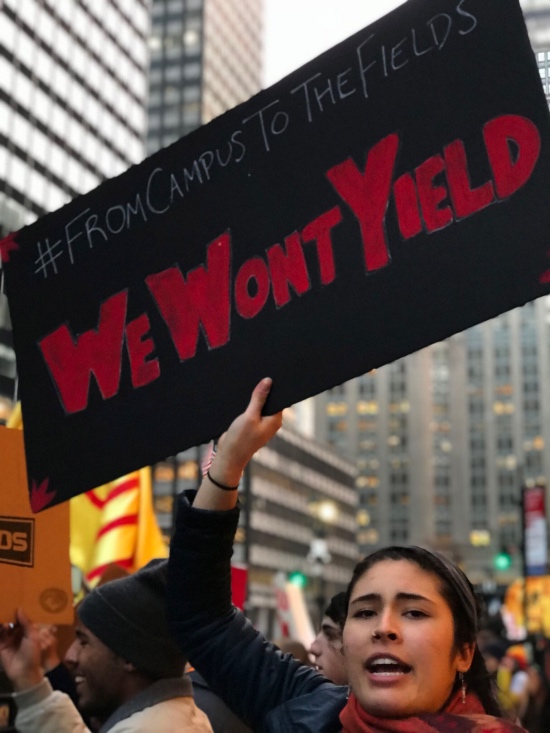
Marquis: “The new movements appear to understand one pillar of the coalition’s success – real and sustainable change can be driven, designed and implemented from inside the communities most affected.”
In her unique style – a style perhaps best described as a marriage of the engineer’s love for astute systems analysis with the advocate’s heartfelt empathy for those facing uphill battles for long-overdue social change – Susan Marquis, Dean of the Pardee RAND Graduate School and author of the definitive history of the CIW’s decades-long struggle for fundamental human rights in the fields, has written a powerful op/ed that draws lessons from the CIW’s history for two of the most compelling movements for social change today, the #MeToo movement and the fight to end gun violence led by the remarkable students from Parkland.
The op/ed, titled “From Florida’s farm fields, lessons for #MeToo and other movements,” was published by United Press International, and is well worth a close reading for the many insights it provides on the keys to successful social change. We have excerpted some of the highlights here below, but be sure to real the piece in its entirety, which you can find here:
June 15 (UPI) – Issues that have been with us for a very long time are suddenly hashtag movements: #MeToo and #TimesUp. #MarchforOurLives. The movements behind these viral hashtags are taking on persistent and complex problems with which society has long struggled, such as the fear or simple reality of sexual harassment and violence in the workplace, or gun violence and the balancing of individual and societal rights. These national movements share a common thread – they call attention to the problem in a very public way and hold out the possibility of finding new solutions.
Potential solutions are coming from what might be considered unexpected places: restaurant kitchens, Hollywood production lots, high schools and corporate offices. Present-day organizers who want to bring about social change would do well to look to Florida farmworkers who took on the low wages, physical abuse and vulnerability that have long characterized agricultural labor in the United States – and won, changing the culture for the better…
… The new movements appear to understand one pillar of the Coalition’s success – real and sustainable change can be driven, designed and implemented from inside the communities most affected. These new voices from the fields, from film studios and from classrooms in such places as Chicago and Parkland, Fla., are powerful in part because they are fighting for their own basic human rights. They are trying to drive change from the ground up instead of from the top down.
A key lesson from the Coalition: To change the system, you need to understand it from end to end. Florida’s farmworkers realized that the food chain runs from farmworkers to crew bosses to growers to corporate buyers like Taco Bell and Walmart. The power is at the top of the chain but powerful corporate brands are vulnerable to changes in consumer opinion about issues like worker abuse and, in the case of farmworkers, slavery. This vulnerability gave Coalition farmworkers and their allies the ammunition to compel buyers and growers to join the Fair Food Program partnership to protect their brands and help them wake up to the basic rights of the workers on whom they depend. The #MeToo movement has uncovered a similar vulnerability by connecting with consumers and constituents to put pressure on celebrity chefs, members of Congress and Hollywood producers.
The networked nature of the world and the broad reach of social media have underscored another Coalition lesson: the power of a coherent and compelling story that can be shared directly to consumers, uncurated by traditional media outlets or delayed by news cycles. The organic nature of the story – regardless of what it grows out of — has the ability to turn a “policy issue” into a human issue, resonating with those who can collectively pressure corporations and perhaps even legislators to rethink constraints that have prevented them from fixing a corrosive problem…
… In their success, the Coalition of Immokalee Workers has shown a way to bring systemic change to an entire industry. The Coalition looked beyond the campaign for worker rights, designed the uniquely comprehensive Fair Food Program and, when they won their fight, paid attention to the details of putting the program in place. The Coalition did not just pressure corporations and growers to change. It developed and led the implementation of the change that workers called for. Instead of looking for legislation and enforcement, the coalition wrote the standards, established a system to monitor compliance and held corporate buyers to enforcing market sanctions for violations. This is a new, community-driven model for solving intractable problems.
The women of the Me Too and Times Up movements have shown courage as they called out powerful men in many walks of life. The students of Parkland and Chicago have shown courage as they firmly stand up to political and community leaders and demand stricter gun laws.
Effecting real and sustainable change – to work to change people’s lives for the better – often requires courage, creativity, persistence and time. Lots of time. A final lesson from the reformation of Florida’s farm fields: In looking for new and different ways to address long-standing and stubborn issues, be willing to do the hard work of designing and even implementing solutions – and persist, persist.
Read the op/ed in its entirety here. And check back soon for more from the Fair Food front, as workers and allies prepare for next week’s big action in New York City!

